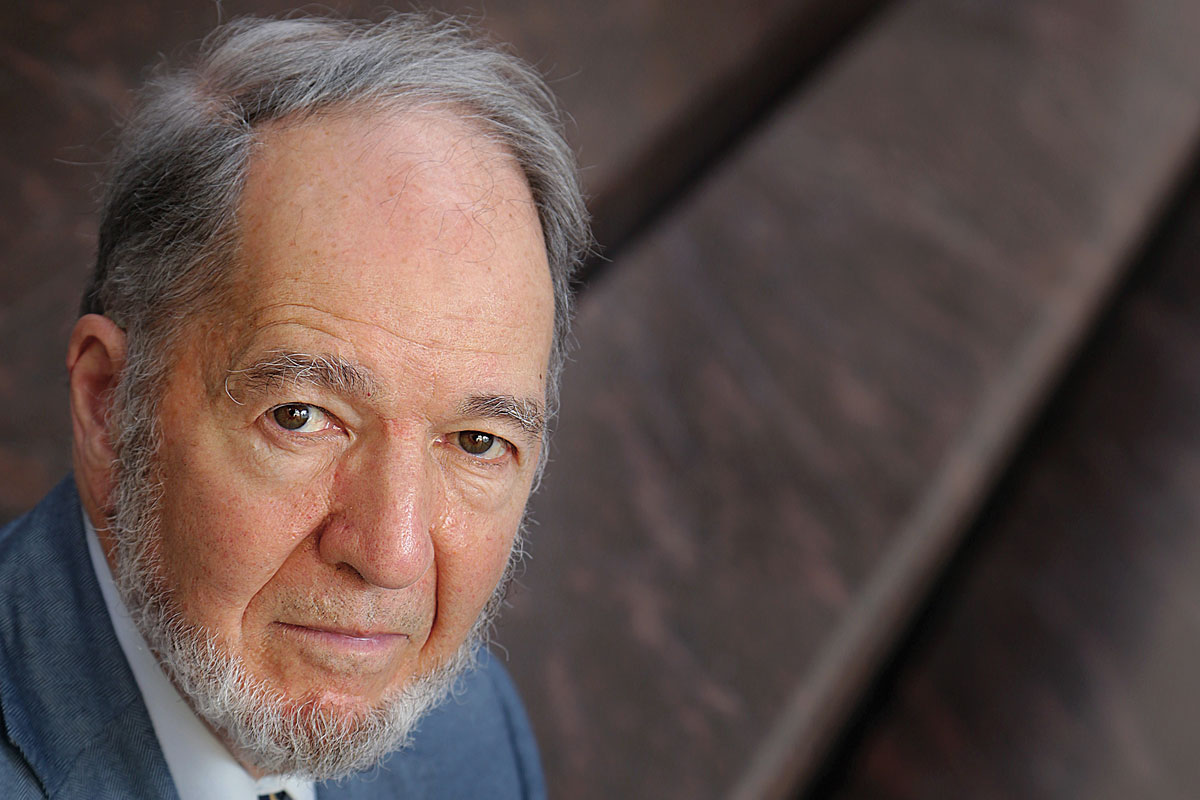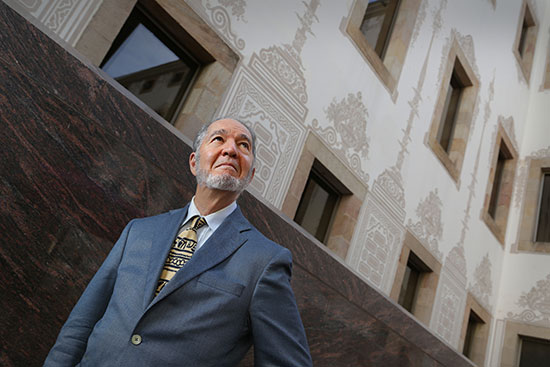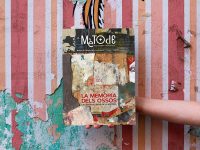Interview with Jared Diamond
«I try to avoid the word progress»
Professor of Geography at University of California (USA)

What can we learn from traditional societies? We might think that nothing, and we would be totally wrong. The World Until Yesterday (Viking Press, 2012), the latest book by the American writer Jared Diamond (born 1937), is a detailed and exhaustive answer to this question. Societies such as those found in New Guinea have maintained their customs and a way of life similar to the one humankind practiced almost throughout its history. These are not, however, societies of primitive and simple individuals; they are complex societies. And studying them can offer many lessons of great value.
According to Jared Diamond, each culture has solved –in their own and peculiar way– the many problems posed by life: How should we raise children? How should we treat the elderly? How should society be organised? How should we deliver justice? Despite Western technological superiority, Jared Diamond maintains that, with regard to the most fundamental issues, the solutions proposed by the West are not superior or better at all.
Winner of the Pulitzer Prize in 1998 for his wonderful Guns, Germs and Steel, Jared Diamond does not practice a paternalistic approach to traditional societies, nor does he consider them exemplary in everything. We just have to focus on the facts. That’s why he does not hesitate to point out, based on statistics, that traditional societies are much more violent than ours. The mythic image of the noble savage inherited from Rousseau is merely an invention.
«Every society applies different solutions to the problems that have always plagued humankind»
Jared Diamond also rejects the idea of progress, but he does not embrace relativism. Rather, he wants us to realize that perhaps the West has made significant progress in areas such as technology, but traditional societies can teach us to live in a different and better way in other aspects such as coexistence. In Barcelona he presented his latest book at the Centre de Cultura Contemporània (CCCB).
What is the most important thing we can learn from traditional societies?
When I speak of traditional societies I’m not necessarily talking about ancient societies. Nowadays traditional societies survive. And the most important thing we can learn from these societies is that there is not a single important thing to learn, rather, there are many. We can draw lessons on all relevant aspects. Every society applies different solutions to the problems that have always plagued humankind, such as how to raise children, or how to treat the elderly, how to look after our health and how to face danger.
And do you think we can actually take some of these behaviors as models?
Our modern society has developed electronics, writing and also huge bombs, but that does not mean we have managed to develop better methods to raise our children than those used by traditional societies. That does not mean, of course, that everything regarding traditional societies is good. In a tribe of New Guinea, for example, when a man dies, his brothers have to choke his widow to death. I do not think this is a good idea.
And how do they raise children?
In traditional societies, children are usually more independent, more confident in themselves. They have developed the ability to negotiate, and are more prepared to make their own decisions, and do so much sooner than Western children. They can also negotiate with adults.
Your latest book has received some criticism, for example, by the anthropologist Stephen Corry. This indigenous rights activist claims your book’s starting point is wrong, because it assumes that contemporary tribes live as they did in the past.
The problem is that Stephen Corry should read my book! In the introduction I already warn readers that contemporary traditional societies have received the impact of modern societies. For this reason, we sometimes do not speak of traditional societies, but of transitional societies. Corry has written a review of my book, but he has not read it.

Jared Diamond / Photo: Jordi Play
Napoleon Chagnon was one of the first anthropologists who argued that the tribes he studied –in particular the Yanomami in the Amazon– lived in a constant state of war. And you have found similar evidence in New Guinea. Is it necessary to bury once and for all Rousseau’s myth of the noble savage?
There are two extremes when it comes to understanding traditional societies. One comes from Rousseau, and consists of imagining that individuals living in traditional societies are peaceful, good, virtuous and gentle. The opposite case is also very common, and consists in considering them primitive, barbaric, despicable people from which we cannot learn anything. The hardest thing is to be realistic. If you are realistic, fanatics of all extremes will attack you. Stephen Corry represents one of these extremes. People who sought to exterminate all members of traditional societies represent the fanatics of the other extreme.
With Chagnon there was a furious reaction from the scientific institutions due to his findings. They tried to demonise him to discredit his ideas.
I’ve read Chagnon’s books. He did incredible research for long periods of time. He has studied the genealogy of the Yanomami, and over 6,000 members of this tribe. He knows more about the Yanomami than any other living human. But there were many people who did not like to hear what he was saying. For example, the missionaries, who wanted to maintain a relationship of monopoly with the Yanomami. There were anthropologists who clung to the idea that the Yanomami were gentle people, so it bothered them that another anthropologist could observe firsthand that they killed each other. These reasons formed an alliance against Chagnon. Recently, Corry has written that Steven Pinker and I have based our conclusions about violence exclusively on Chagnon’s work, but that is not true. It is a source among many others.
Pinker notes that there is currently a decrease of violence in the history of humankind. Do you agree with this view?
«Depending on the question you contemplate, it may be more appropriate to adopt a materialist, cultural or evolutionary perspective»
That is empirically correct. It is not a matter of opinion. The statistics also show us that life expectancy has increased, and that illiteracy is decreasing. And violence has been declining in recent centuries. There are many reasons for this phenomenon, and Pinker discusses them in detail in his latest book [The Better Angels of Our Nature]. But perhaps the issue should not be so focused on violence itself, but rather on the methods to reduce it. In many traditional societies, in fact, we also find mechanisms to avoid it and to resolve disputes and conflicts. Traditional societies in New Guinea resolve conflicts placing the emphasis on interpersonal relationships and how to restore them. In a court of a Western society, such as a Spanish court, if there is a case of two siblings arguing over an inheritance, the court will be concerned only about determining who is right and how much money belongs to each one. It will not be concerned, however, about the fact that the siblings will most probably not speak to each other anymore. The experience of the courts in state societies focuses on what is right or wrong, in establishing who is guilty or innocent. In contrast, in many traditional societies, when a dispute arises, the main objective is to restore relationships. Traditional societies are small, and people have to coexist for their entire life. If there is a dispute over a pig, the pig is ultimately what matters the least, and all efforts are focused on getting the people who have fought back on speaking terms.
But we do not live precisely in societies with few individuals. It does not seem feasible to take this form of justice as a model.
«Societies have become more complicated and bigger, and in some cases they work better, but in others they work worse. That is why I do not like to speak about progress.»
It is more difficult to reproduce, but there is a movement that tries to combine the best of the two models: the model of state justice and the model of traditional justice. It is called restorative justice. In this type of justice, if the two parties agree –even in extreme cases where there has been a murder– a dialogue aided by a mediator takes place. There was an extreme case in California. A murderer was able to talk to the widow of the man he had killed. The widow was naturally full of hatred towards the murderer who had ruined her life. And the murderer, who had been sentenced to eleven years in prison, ended up understanding the consequences of what he had done. Restorative justice put the murderer and the widow together. The widow spoke for a couple of hours about her joint life with her husband, about how he liked to ride his bicycle, and she also explained that when she turned on the radio he always came to her mind. Moreover, the widow was convinced that the murderer was an evil person who had committed the murder for no reason. And at this point the murderer was able to explain that during his childhood he had been abused, sexually and physically. The bones he had had broken as a result forced him to take painkillers throughout his adult life. He explained that he had a girlfriend, and that the day before committing the murder he had run out of painkillers and his girlfriend had left him. In court he had not come to confess to the crime, but he did so in front of the widow. «I killed your husband intentionally,» he said. It was emotionally draining for both, but in the end, the widow ended up saying: «Forgiving is hard, but not forgiving is even harder.» That is restorative justice.
This kind of justice has been attempted in the Basque Country with regard to ETA terrorism. Don’t you think there may be cases where murderers can use this form of justice to reintegrate into society without regretting the deaths?
That’s true. Restorative justice is an experiment, and it works much better in some cases than in others. I try to imagine in which cases it would work best. But one thing is clear: it can only work if both parties agree. Well, it is an ongoing experiment.
Have your cultural studies forced you to reconsider the nature-nurture issue somehow?
If an infant is not fed with milk, the problems that arise can be attributed to nurture. If he is born with an extra chromosome and develops Down syndrome, then we have a case concerning the nature. They are two extremes. Everything that falls in between refers to the problem of nature versus nurture. There is no doubt that there are genetic and cultural components that affect, for example, intelligence. But deciding what is the most important aspect would be like asking if my wife’s left hand is more beautiful than her right hand. And both are beautiful.

Jared Diamond / Photo: Jordi Play
Have you come across any kind of ideological opposition when defending your ideas in scientific institutions?
Yes, but criticism did not come so much from institutions as it did from specific individuals. There are people who are linked to a materialistic view of human societies, other who perform a cultural approach, and there are also evolutionary approaches. Each perspective can be useful to understand some aspects, but all have limitations. If you, for example, want to study the case of the deceased man’s brothers who choke his widow to death, using a materialistic perspective makes no sense. That has happened to me with my own books. There are people who have accused Guns, Germs and Steel of relying excessively on geography and the environment. And indeed, much of the book deals with these issues, as the questions I contemplated demanded it. Then they took my book Collapse and said: «Jared Diamond talks about culture now. He has changed his mind.» But that is not it, I simply focus on a different problem and I do it from another perspective. And they have finally taken The World Until Yesterday and say once again: «Jared Diamond has stopped talking about geography, he is now concerned with culture.» But again this is not true. Depending on the question you contemplate, it may be more appropriate to adopt a materialist, cultural or evolutionary perspective.
What role do you think the government has in the progress of humankind? Has it been one of the best tools of progress?
I try to avoid the word progress. By progress we understand that things work better and better. In the past 11,000 years, societies have become more complicated and bigger, and in some cases they work better, but in others they work worse. So I do not like to speak of progress.
There are intellectuals such as the philosopher Daniel Dennett who identify nationalism with a tribal emotion, rather primitive, typical of closed societies. What is your opinion of nationalism?
«Nationalism focuses on groups with a linguistic, ethnic or political identity. Is nationalism is good or bad? We have to define it as neutral»
Nationalism focuses on groups with a linguistic identity, an ethnic identity or a political identity. Is nationalism good or bad? Nationalism in Germany between 1939 and 1945 was very bad. Japanese nationalism between 1932 and 1945 was bad. Finnish nationalism in 1939 was good: the Russians –a state with 150 million people– attacked this small state inhabited by no more than three million people. The pride of the Finns allowed them to resist the attack and maintain their independence. In this case nationalism was good and healthy. Finnish nationalism is not defined by having a low opinion of other groups; it is based on a sense of pride towards their language. They do not hate their neighbors; instead, they are especially proud of the accomplishments they have achieved. That is why we should define nationalism as neutral, neither good nor bad.





